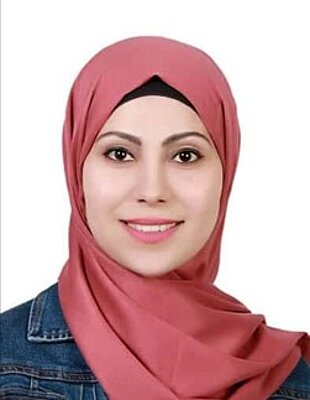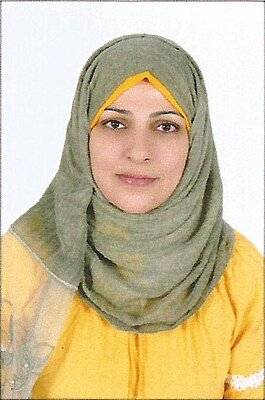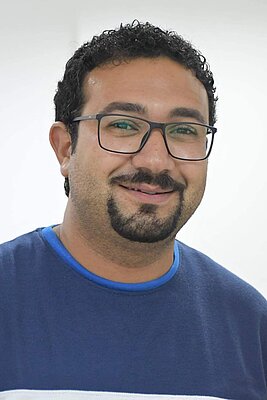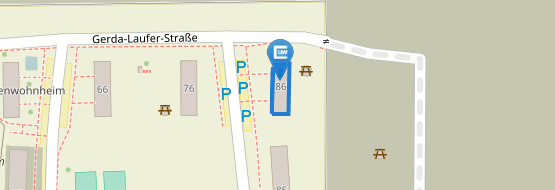SoSe 2021: Austausch digital - Ägyptische Studierende im Interview
Digitales Sommersemester 2021: Austausch in Zeiten der Corona Pandemie
Im Sommersemester 2021 wurde kurzfristig sechs ägyptischen Studierenden ein digitales Semester an der JMU Würzburg ermöglicht. Weil auch die deutschen Studierenden digitale Veranstaltungen besuchten, war es relativ leicht möglich ägyptische Kommiliton*innen zuzuschalten. Dennoch mussten sie eng betreut werden. Neben Sprachkursen bewährte sich auch digital die Begleitung durch Buddies und einer Tutorin. Auch wenn der persönliche Kontakt fehlte, dies war doch ein sehr wertvolles Trostpflaster für beide Seiten. Wir haben den Teilnehmer*innen ein paar Fragen gestellt.
Fünf Fragen an unsere digitalen ägyptischen Austauschstudent*innen
- How did you experience the digital exchange offer? What are the advantages and disadvantages?
Sabah: The digital semester in general was pretty good and I benefited a lot from it. The coordinators and lecturers made a great effort to facilitate everything for us. As for the advantages, getting to know new perspectives on museums through German lecturers and guest lectures that covered almost everything related to museums, and the participation with German students in many tasks was very fruitful due to our different backgrounds and experiences, so we shared our knowledge and views and I think this benefited all of us. As for the disadvantages, it was only studying from home, we could not visit German museums, deal effectively with lecturers and students and experience German culture in person.
Shaimaa: Digital exchange advantages: Offer multi-cultural exchange. Broadened my mind with new ideas. New experience gained. Experienced object out of Egypt this was the first time for me. Disadvantages: Online lectures didn't give me the knowledge that i expected, because the internet was unstable in Egypt.
Mohamed: It is an alternative and ideal solution in the event of a serious pandemic like the one we are in the age of CORONA virus, which hinders travel and actual scientific exchange. From my point of view, the digital exchange with museum studies experts from the University of Würzburg has achieved great success in communicating information and interacting remotely in various study programs and also in interaction with colleagues from German students, we learn more from them and it was a big chance to exchange our experience . Perhaps one of the tangible advantages is seeing new experiences in the field of the museum worker and digital interaction by various means and seeing museum collections in international museums, which adds to personal experiences a lot as well as from the advantages of getting to know an international perspective of my museum work. About disadvantages: We must all agree that the digital exchange will not reach information or experience as it is in the case of actual exchange and direct interaction with museum programs and exercises in a museum exhibition, for example, such as an integrated exhibition of a specific topic. The digital exchange did not allow us to actually participate in it in a practical way, in application of a actual model, but it was only participation in theory with ideas only and with discussion remotely from behind screens.
Enas: For me, the digital seminar was very good, and it was an appropriate solution during the Corona pandemic. The professors and lecturers proceeded well and were able to communicate information and expand our awareness by presenting different points of view of the museum and its scenography1, as well as everything related to the objects and exhibitions within the museum, which differs significantly from what is available in our Arab country.
About The Advantages: It was an excellent event for me, as I gained valuable teamwork experience. And the exchange of experiences between students and workers in German museums, as well as it allowed us to share our experiences as workers in a group of the most important museums in the Arab world, Like the Grand Egyptian Museum
About disadvantages: Of course, travel and direct communication differ from digital communication, and one of the most significant flaws for me was the inability to travel to Germany, visit museums, and see the magnificence of the building structures and German history, as well as the inability to participate with my German colleagues in implementing the idea of our exhibition Held in the Martin von Wagner Museum.
- Where do you see differences in museum studies in Würzburg and Cairo?
Sabah: There is not much difference between studying museums in Würzburg and Cairo, but from my point of view the study in Würzburg was much more effective by organizing many workshops and making us more involved and not in the old style as in Cairo.
Shaimaa: The museum studies in Würzburg are more practical than in Cairo with field tours and workshops.
Mohamed: Studying museums in Würzburg is very interesting because there are many different museums that also specialize in distinct topics and also use modern technology, which have a different museum presentation and use of technology as well as how to deal with the visitor. It is this diversity that allows to think more about how to easily convey the information to the visitor, and there are also those who provide the opportunity for the visitor to search and investigate to access the information. So there is constant development and keeping pace with the times and what emerges from museum sciences in studying museums in Würzburg. As well as interacting with many global experiences from museum science specialists, presenting ideas and discussing them in a creative way, as well as seeing museums from a wide internationally perspective.
Enas: The major difference, in my opinion, was in the museum's concept and exhibits, as well as how different topics are chosen, and it is not needed that they are historical. I believe their use of technology in museums for the purpose of integrating tourists differs from what was happening in Egypt, but Egypt has now begun to use modern technology as a key factor in attracting visitors and ensuring an enjoyable visit to newly created museums, such as the Grand Egyptian Museum and the National Museum of Egyptian Civilization.
- What do the museums in Egypt mean to you?
Sabah: For me, a museum is a public space for community service and development, welcoming everyone regardless of age, language, educational background, culture, class and religion for education and entertainment together. A place that connects the past with the present to introduce visitors to the greatness of our past and our duty to preserve and learn from it.
Shaimaa: Museums in Egypt mean houses of art and history.
Mohamed: Museums in Egypt are an environment of politeness and learning, and it is a living memory that expresses the continuity of the ancient past with all it carries from thought, culture and history up to the present to preserve it for the future to come.
Enas: A museum is a time machine that uses modern technology to transport visitors to the past. It is an organization devoted to spreading civilization, culture, and the arts. The museum provides a safe home for artefacts to maintain, preserve, and protect as a legacy for the future generation.
- What should a German not miss when he is in Cairo for the first time? Do you have a personal insider tip?
Sabah: To visit the streets of old Cairo, such as the religious complex where civilizations meet, and Moaz and Al Hussein Street, you will feel that you are in a huge open museum that you will be fascinated with, in addition to tasting traditional Egyptian food from these places.
Shaimaa: The German should learn some basic Arabic words before they come to Egypt, they must have a plan for Cairo and install taxi apps such as Uber and Careem.
Mohamed: Cairo is one of the world's great megacities. Full of vigor, Cairo is where you really get a feeling for Egyptian street life. No trip to Egypt is complete without a stay in the city Arabs call Umm al-Dunya (The Mother of the World). The main tourist attraction everyone is here to see is the Giza Pyramids on the city's doorstep, but the city itself is crammed with major monuments that span centuries of history. There are so many things to do in Cairo that you'll only be able to cover a sliver on one trip. My advice is not to get carried away by your first impression when you visit Cairo when its sheer noise, pollution, and traffic can make a first visit here difficult to navigate, but Egypt's capital has so much to offer travelers that look beyond its problems.
Enas: Egypt is one of the most beautiful Arab countries, with numerous monuments, treasures, and tourist attractions that must be seen to appreciate its beauty. The great pyramids of Giza and the city of Luxor, with its ancient temples and monuments such as the Karnak Temple and Luxor Temple, as well as many museums such as the Egyptian Museum in Tahrir, the Islamic and Coptic Museum, the Complex of Religions, and Al-Muizz Street, and other places that represent the greatness of our history. There is also leisure tourism, such as Marsa Alam, Sharm El Sheikh, Hurghada, the North Coast, Alexandria, and an Eco-Museum at Nuba in Aswan where you can learn about the Egyptian people's beauty and kindness, as well as their history, customs, and traditions. Aside from entertainment, there are a number of recently established museums, such as the Sharm Museum. The Sheikh and his Library in Alexandria Medical tourism, such as the oasis, Moses' sulphur springs, and Marsa Matrouh's salt caves.
You should taste Egyptian food as well. A visit to the Grand Egyptian Museum and the Conservation Center is also recommended.
- Has the Corona pandemic changed the museums in Egypt?
Sabah: Indeed, Egyptian museums were affected by the Corona epidemic, and museums were closed for a while and then reopened with the implementation of all precautionary measures and many activities stopped, which led to a decrease in the number of visitors, but despite that, Egypt opened many new museums in different regions of Egypt and some large and important celebrations were held to promote Tourism and encourage domestic tourism, and things began to gradually improve and become normal.
Shaimaa: Covide-19 at the beginning of the pandemic changed the museums a lot, most of the museums closed and after while opened again with many restrictions but now the restrictions became so little.
Mohamed: For sure yes. The measures taken during the COVID-19 crisis in the Museums in Egypt play an important role in enhancing community engagement and overcoming social isolation. With its rich cultural and educative contents and societal functions, several initiatives undertaken in response to COVID-19 are applied in the Museums. The risk preventive measures for the safety and security of the museums, their staff, and visitors are one of the main approaches. In addition, the development of a variety of digital tools including virtual tours, social media, live streaming, online exhibitions, and online video. The guidelines also include the installation of floor signs for social distancing and daily temperature checks for visitors and staff.
Enas: In Egypt, the COVID-19 crisis in museums has been essential in encouraging community participation and combating social isolation. Many preventive measures are implemented against threats to the safety and security of museums, their personnel, and visitors as a result of their rich cultural and educational content and societal activities. It has also paved the way for the development of new strategies for administering museums during pandemics and disasters, as well as alternate plans for use in the event of future issues. It inspired institutions, such as the Coptic Museum in Cairo, to develop a variety of digital capabilities, including virtual tours, social media, live broadcasts, online exhibitions, and online video.





